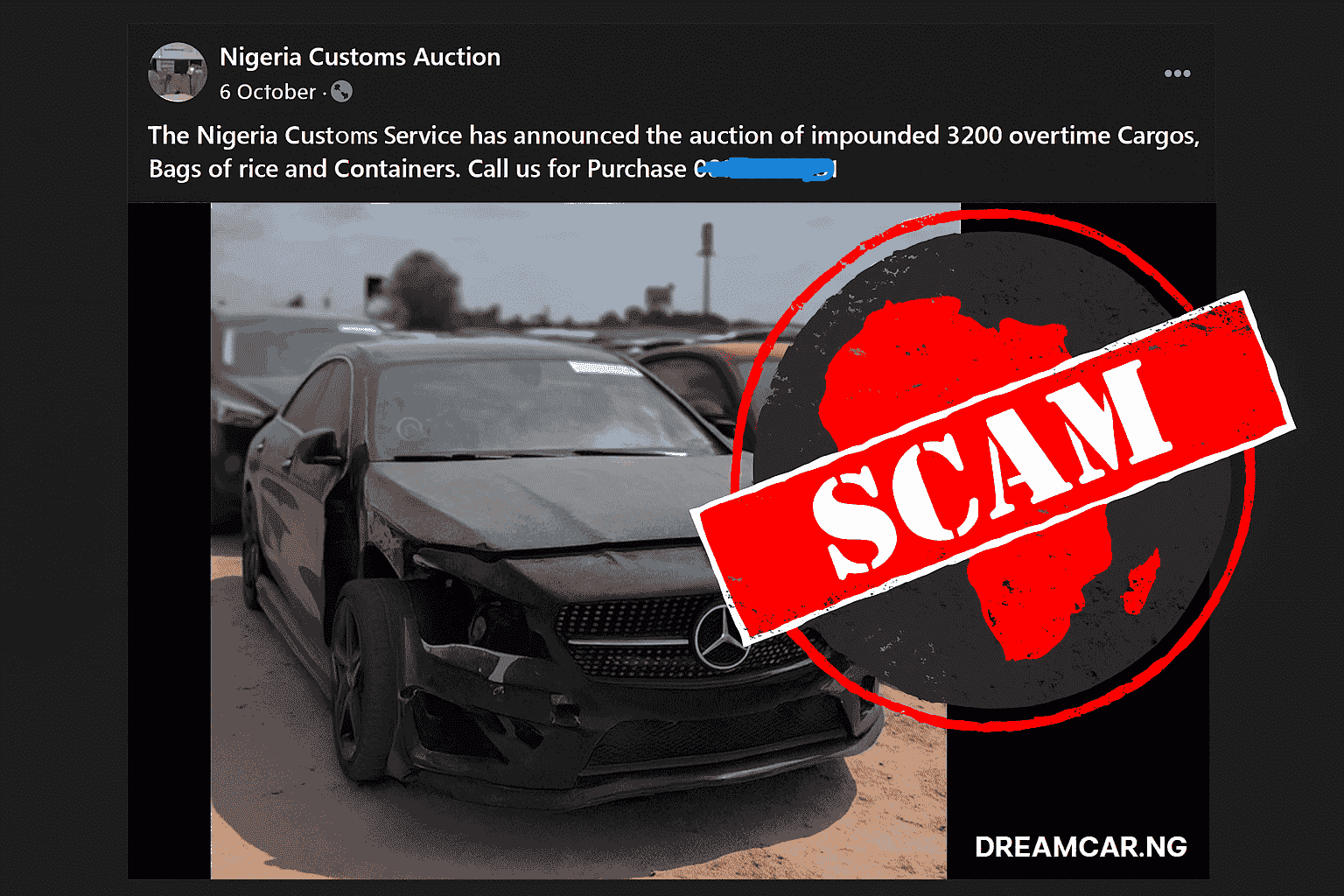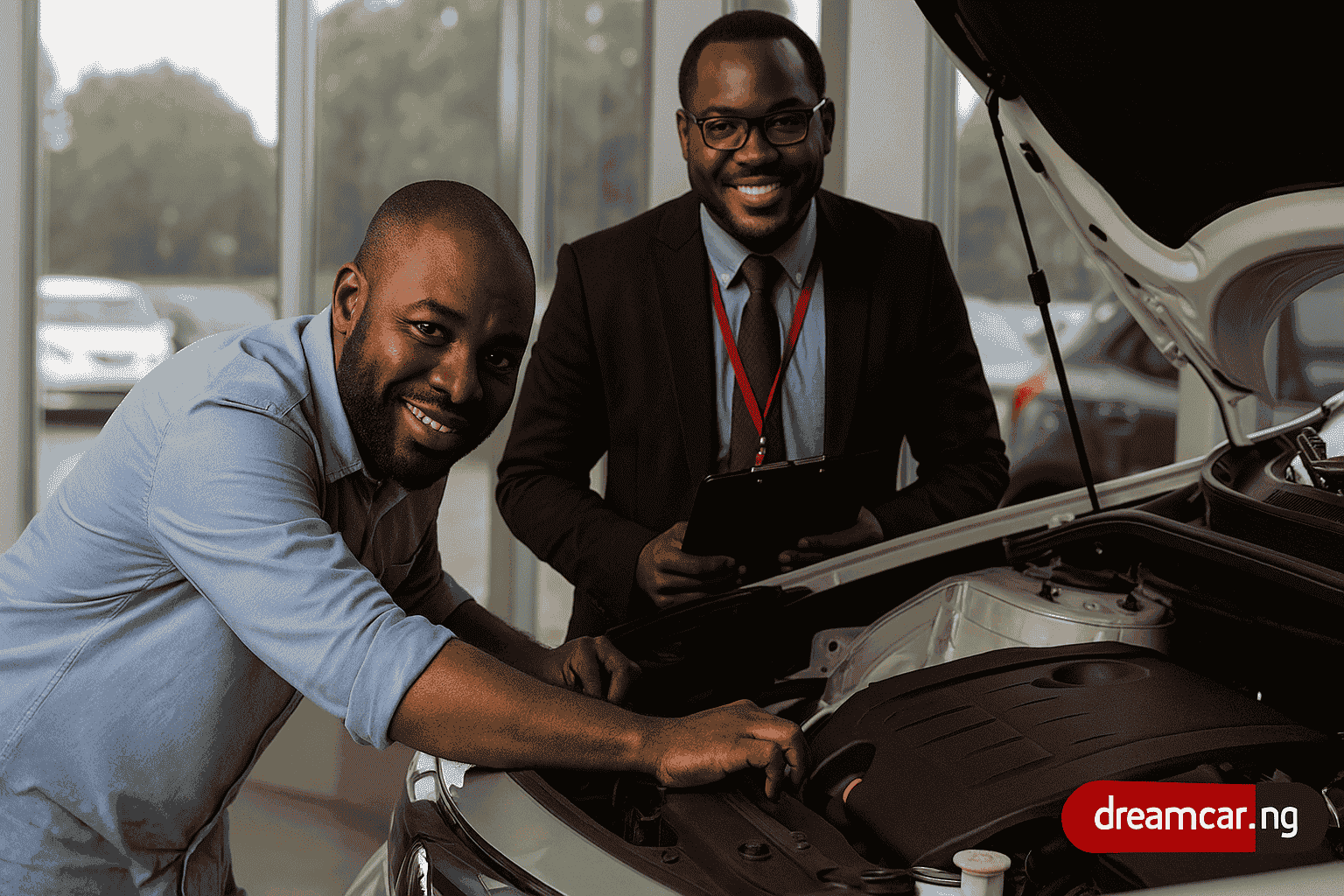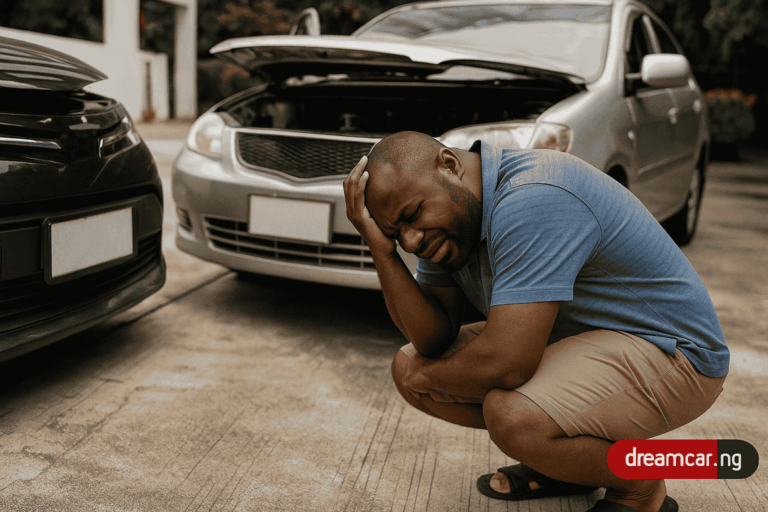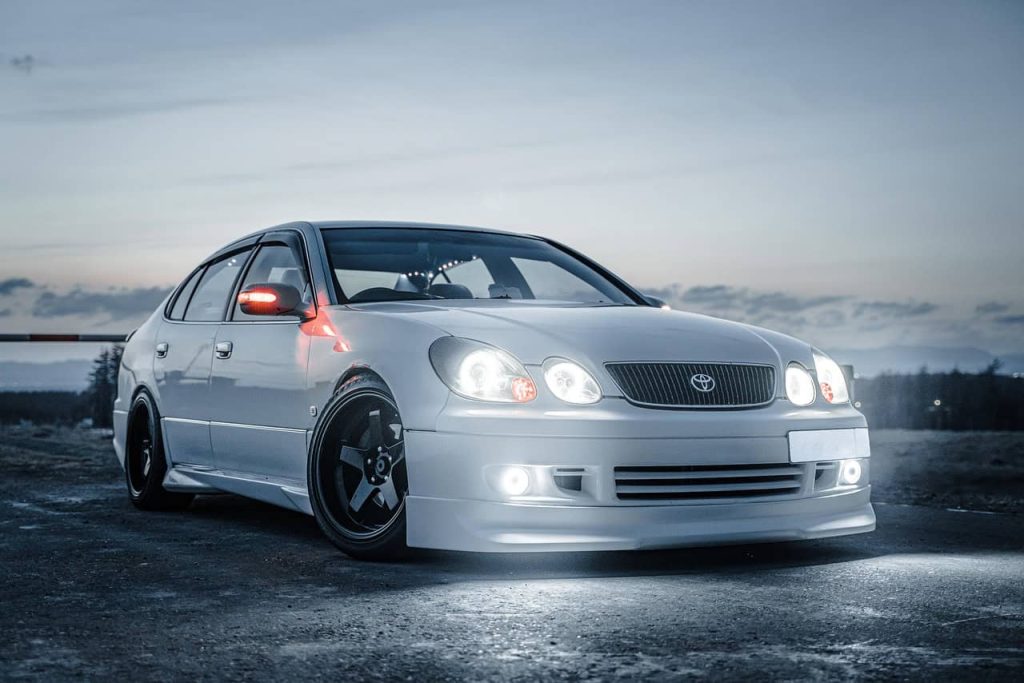Buying a car in Nigeria can be one of the most rewarding milestones in life, a symbol of progress, independence, and convenience.
But in recent years, this exciting journey has also become a hunting ground for fraudsters who exploit unsuspecting buyers.
Every week, hundreds of Nigerians lose millions of naira to fake car dealers, manipulated vehicle papers, and online marketplace scams that look completely legitimate at first glance.
From Lagos to Port Harcourt, Abuja to Enugu and all other major cities in Nigeria, car scammers have perfected different tricks.
Ranging from cloning genuine listings on Facebook and Jiji to using forged customs papers and impersonating trusted dealerships.
The growth of online car trading has made it easier than ever to find cars, but it has also opened the door to sophisticated scams that target even experienced buyers.
It’s crucial to understand how these scams work and how to identify them before parting with your hard-earned money.
Knowing what to check, what to question, and where to buy can mean the difference between driving home your dream car and losing everything to a clever fraudster.
In this complete and up-to-date guide, we’ll uncover the most common car scams in Nigeria, explain how to recognize the warning signs, and share expert tips on how to safely buy a car in 2025 and beyond.
By the end, you’ll have the knowledge and confidence to navigate Nigeria’s car market like a pro and protect yourself from costly mistakes.
Why Car Scams Are So Common in Nigeria
The Nigerian car market is one of the largest and fastest-growing in Africa.
Every day, thousands of vehicles exchange hands across Nigeria from Tokunbo imports to locally used cars.
While this booming demand has made car ownership more accessible, it has also created fertile ground for scammers who take advantage of desperate or uninformed buyers.
With the rise of online trading platforms and social media car groups, more Nigerians now search for cars on the internet than ever before.
Unfortunately, scammers have quickly adapted to this digital shift.
They create fake listings, pose as genuine dealers, and use stolen car photos to attract attention.
Once they’ve gained a buyer’s trust, they disappear with deposits or “inspection fees” before the buyer realizes what happened.
Another reason car scams thrive is because of the market’s weak verification structure.
Many buyers don’t know how to confirm vehicle documents, ownership details, or customs duty status.
Others get carried away by unbelievably good bargains that usually end in regret.
The truth is simple: the cheaper the deal looks, the higher the risk of a scam.
Understanding how car scams work in Nigeria is the first step toward avoiding them.
Once you know the common tricks used by fraudulent sellers, you can spot the warning signs early and protect your investment.
Common Types of Car Scams in Nigeria
1 Fake Online Listings
Fake online listings are by far the most widespread type of car scams in Nigeria today.
Scammers upload attractive pictures of cars they don’t own to popular platforms such as Facebook Marketplace, Jiji, Instagram, and even WhatsApp status.
These images are usually stolen from real dealerships or foreign websites, making them look authentic enough to deceive even experienced buyers.
Once you contact the supposed seller, they’ll often claim the car is in high demand or that “another buyer” is already showing interest.
To lock in your interest, they’ll request a small payment labeled as a “commitment fee,” “booking fee,” or “inspection charge.” The moment you send the money, the scammer cuts off communication or blocks your number completely.
How to Avoid This Scam:
Never send money to anyone before physically inspecting the car and confirming that the seller is legitimate.
Insist on meeting the seller at a secure location and verifying all documents in person.
Most importantly, only use trusted car marketplaces or verified dealers.
2 Fake Dealers and Impersonators
Another common trick in Nigeria’s car market involves scammers posing as legitimate car dealers or importers.
These fraudsters often operate under stolen business identities or fake company names to appear credible.
Some even go as far as renting an office space for a few days, printing professional business cards, and displaying cars they don’t actually own to create the illusion of a registered dealership.
They rely heavily on presentation and confidence offering attractive discounts, showing photos of imported cars “on the way,” or claiming to have exclusive access to auction vehicles from abroad.
Their goal is to collect deposits or “import processing fees” and disappear before the buyer realizes the fraud.
How to Avoid This Scam:
Always verify a dealer’s registration with recognized authorities or associations.
Legitimate car dealers should have verifiable business names, physical addresses, and traceable phone numbers.
Before committing to any payment, confirm vehicle ownership directly with the Federal Road Safety Corps (FRSC) or your local Vehicle Licensing Office.
You can also check online reviews and ask past customers about their experience.
Remember, genuine dealers encourage verification because they have nothing to hide.
3 Odometer Fraud (Mileage Tampering)
Odometer fraud is another subtle yet widespread scam in Nigeria’s used-car market.
This happens when dishonest sellers manually or digitally roll back a car’s mileage to make it appear newer and less used than it truly is.
A car showing 65,000 km might have actually covered over 150,000 km, meaning you’re paying a premium for a worn-out vehicle.
This kind of manipulation can be done using simple diagnostic tools, especially on imported Tokunbo cars.
The effect is that the car seems like a great deal, clean interior, smooth engine, low mileage but major issues start appearing shortly after purchase.
How to Avoid This Scam:
Always carry out a diagnostic scan or inspection with a trusted mechanic before buying.
Modern scanners can detect tampered mileage or mismatched data between the odometer and the car’s ECU.
Also, look out for physical signs of wear and tear, worn pedals, faded buttons, or sagging seats that don’t match the stated mileage.
If possible, request maintenance records or import history reports for additional confirmation.
4 Stolen or “Double Paper” Cars
Stolen or “double paper” cars are one of the most dangerous scams in Nigeria’s vehicle market.
These are cars that were either stolen locally or imported illegally and then resold with forged or duplicated documents.
In many cases, multiple buyers are unknowingly sold the same car, each holding fake registration papers that appear genuine.
The danger here is enormous, even if you buy the car in good faith, the real owner (or law enforcement) can reclaim it once it’s discovered.
You could lose both the vehicle and your money overnight.
How to Avoid This Scam:
Before paying for any car, cross-check the Vehicle Identification Number (VIN) with the FRSC and verify the customs duty clearance with the Nigeria Customs Service (NCS).
Ask to see the original documents, not photocopies, and confirm that the chassis number, engine number, and registration details match perfectly.
If anything feels inconsistent or rushed, walk away. It’s far better to miss out on a deal than to lose millions to a stolen or double-paper vehicle.
5 Fake Auction or “Embassy Car” Deals
Another clever scam circulating in Nigeria’s car market involves fake auction or embassy car deals.
In these situations, the fraudster claims to have access to cars seized by the Nigeria Customs Service or vehicles supposedly owned by foreign embassies that are being sold off cheaply.

The prices are usually too good to ignore, sometimes up to 60% lower than market value and the seller often insists that you must pay immediately to secure the deal before someone else takes it.
They back their claims with photos of luxury cars, convincing stories, and sometimes even forged customs or embassy documents.
However, once payment is made, the buyer never receives the vehicle and the seller vanishes without a trace.
Many victims realize too late that there was never any auction or embassy sale in the first place.
How to Avoid This Scam:
Treat any car offer that seems unbelievably cheap or urgent with extreme caution.
Genuine customs or embassy auctions in Nigeria are always announced publicly through their official websites or verified platforms, never through random WhatsApp groups, Facebook ads, or private calls.
Take your time, consult trusted sources and verify every claim independently.
Proven Tips to Avoid Car Scams in Nigeria
Now that you know the common tricks used by car scammers, the next step is learning how to protect yourself.
Either you’re buying online, through a dealer, or from a private individual, these proven strategies can help you avoid getting defrauded and ensure your purchase is 100% genuine.
Always Inspect the Car in Person
Never make a payment for any car you haven’t physically seen.
Photos and videos can be edited or stolen from real listings, so in-person inspection is the only true way to confirm authenticity.
Visit the car’s location yourself, or if you’re unavailable, send a trusted friend or professional mechanic to inspect on your behalf.
This inspection should include checking the car’s condition, verifying the engine and chassis numbers, and confirming that it matches the photos shared by the seller.
If the seller refuses a physical inspection or starts making excuses about being out of town or too busy, it’s a major red flag.
Real sellers are always willing to show their cars before collecting payment.
Meet in Public and Safe Locations
Always prioritize safety when meeting a car seller.
Arrange to meet in secure, public areas such as police stations, shopping mall car parks, or established dealership compounds.
Avoid deserted areas or private residences, especially if you’re going alone.
Scammers and car thieves often lure buyers to unsafe locations to rob them or pressure them into quick, uninformed payments.
For added security, inform a friend or family member about your meeting and share the location details.
Keep in mind that genuine sellers value transparency, they’ll have no issue meeting in a safe, open environment.
Verify All Car Documents Thoroughly
Car documentation verification is one of the most overlooked yet critical steps in preventing scams.
Always insist on seeing the car’s complete set of papers, including:
- Proof of Ownership – Confirms the registered owner’s identity and matches the seller’s details.
- Customs Duty Papers – Verify authenticity with the Nigeria Customs Service. Fake or unpaid duties can lead to car seizure.
- Roadworthiness Certificate – Shows that the car has passed safety and mechanical checks.
- Insurance and Vehicle License – Confirms the car’s legitimacy and registration validity.
Ensure that all information on these documents, especially the engine number, chassis number, and VIN matches perfectly with the physical car.
If any number has been tampered with, scratched off, or looks inconsistent, walk away immediately.
A genuine car should always have a clean, traceable history.
Avoid “Too Good to Be True” Prices
One of the most common traps that buyers fall into is chasing unbelievable deals.
If a car’s price looks suspiciously cheap compared to others on the market, it’s almost always a scam or a car with hidden problems.
Many fraudsters deliberately post heavily discounted prices to lure buyers who are desperate for bargains knowing that greed and urgency cloud good judgment.
Every car has a realistic market range based on its brand, model year, condition, and mileage.
When a deal sounds too good to be true, it usually is. Always cross-check prices from multiple trusted sources before committing.
You can start by reviewing our detailed guide to the top 7 cheapest used cars in Nigeria to get a sense of genuine pricing trends and avoid falling for unrealistic offers.
Buying cheap shouldn’t mean buying blindly. Prioritize value, not just price.
Use Trusted Dealers and Marketplaces
In today’s fast-paced digital market, anyone can upload car photos online but not everyone is a legitimate seller.
To stay safe, always buy from trusted sources that verify listings and sellers.
Reputable car marketplaces reduces the risk of scams and also give you peace of mind through transparent processes and buyer protection measures.
Instead of dealing with random social media accounts or unverified WhatsApp sellers, explore trusted platforms or walk in a physical car stand.
Working with verified sellers may cost slightly more upfront, but it saves you from the financial and emotional pain of being scammed.
Do a VIN and Background Check
The Vehicle Identification Number (VIN) is like a car’s fingerprint it holds the complete record of its origin, specifications, and ownership history.
A quick VIN check can reveal valuable details about the car, such as whether it was previously stolen, flooded, involved in an accident, or has been tampered with.
Before you finalize any deal, perform a VIN lookup using trusted online databases or local verification services.
Some websites offer free basic VIN checks, while others provide detailed reports for a small fee a small price to pay for peace of mind.
Be especially cautious of imported cars from the U.S. or Europe, where hidden accident or salvage histories are common.
Confirming a car’s VIN record helps you verify its authenticity and also protect you from unknowingly buying a stolen or blacklisted vehicle.
Don’t Make Full Payments Until Ownership Transfer
This is one of the golden rules of safe car buying in Nigeria.
Never pay the full amount for a vehicle until ownership has been legally and verifiably transferred to you.
Many scammers rely on buyers’ impatience once they receive full payment, they disappear or create obstacles to prevent document transfer.
Instead, structure your payments smartly. You can pay a small inspection or reservation fee (if necessary) and complete the balance only after verifying all documents and confirming that the car is officially registered in your name.
For high-value transactions, consider using an escrow service or a trusted intermediary to hold funds until the transfer is complete.
Also, ensure that every payment whether partial or full is documented with a signed receipt showing the seller’s name, contact details, and ID number.
This protects you legally and provides evidence in case of disputes.
Buying a car is a major investment, and taking these extra steps ensures that your hard-earned money goes into a legitimate, verifiable transaction and not a scammer’s pocket.
3. Best Practices for Buying Used Cars Safely in Nigeria
Buying a used car in Nigeria doesn’t have to be a gamble. With the right approach and professional due diligence, you can find a reliable vehicle that fits your budget without falling into scam traps.
Follow these expert-backed best practices to make your next car purchase safe, smart, and stress-free.
Always Use a Trusted Mechanic or Auto Inspector
Before finalizing any used car deal, ensure a professional mechanic or auto inspection expert examines the vehicle thoroughly.

Hidden faults such as engine wear, transmission issues, or accident damage might not be visible to the untrained eye.
A mechanic’s report can save you from buying a “lemon” that’s a car that looks good on the surface but is full of expensive problems underneath.
Even if the seller insists that the car is in perfect condition, never skip inspection.
A trusted mechanic is your first line of defense against fraud and overpriced vehicles.
Request Receipts and Verify Seller Identity
Every car transaction should leave a verifiable paper trail.
Always collect a signed receipt containing the seller’s full name, phone number, address, and valid ID number (such as a driver’s license or national ID).
This simple step can protect you in case of disputes or fraudulent sales.
Also, confirm that the seller’s details match the name on the vehicle’s documents including the proof of ownership, customs duty certificate, and insurance papers.
If there are any mismatches, delay the transaction until everything checks out.
Consider the Car’s Resale Value Before Buying
Not all cars hold their value equally. Some models depreciate quickly, while others remain in high demand for years.
Understanding resale potential helps you make smarter financial decisions especially if you plan to upgrade later.
We recommend reading our expert guide on cars with the best resale value in Nigeria to know which brands and models offer long-term returns.
Cars that are fuel-efficient, affordable to maintain, and widely trusted by Nigerian drivers are usually the most rewarding investments.
Understand Market Pricing and Negotiate Smartly
Before negotiating, research current market prices for the exact make, model, and year of the car you want.
Knowing the market rate helps you spot unrealistic deals and negotiate confidently without being overcharged or manipulated.
You can explore our cheap car buying guide for 2025 to understand price ranges across different brands and conditions.
Knowledge is your greatest bargaining tool, it turns you from an ordinary buyer into a well-informed negotiator.
4. What to Do If You Suspect a Car Scam
Even the most careful buyers can encounter suspicious sellers.
If at any point you suspect that a car deal might be a scam, act fast and follow these steps to protect yourself and help others stay safe:
Stop Communication Immediately
Do not continue conversations, share more personal details, or send additional payments.
Scammers often use emotional pressure or urgency to push buyers into completing fake transactions.
Pause all communication until you verify the situation.
Preserve All Evidence
Save every message, receipt, phone number, and transaction record related to the suspected scam.
Screenshots, chat logs, and payment proofs can serve as critical evidence when filing an official complaint or legal case.
Report to Relevant Authorities
In Nigeria, car scam cases can be reported to the following agencies:
- Economic and Financial Crimes Commission (EFCC) – For fraud and online transaction scams.
- Nigeria Police Force Cybercrime Unit – For internet or social media-related car scams.
- Consumer Protection Council (CPC) – For complaints involving deceptive business practices.
Providing clear details and evidence improves your chances of getting justice and helps authorities track down fraudulent networks.
Share Your Experience to Help Others
One of the best ways to combat car scams is through awareness.
Share your story on verified platforms, consumer forums, or automotive communities.
You empower other buyers to stay alert and avoid scam traps if you expose how they operate
Car scams thrive in silence, your voice could save someone from losing their life savings.
Conclusion: Stay Smart and Buy Safe
The Nigerian car market is full of great opportunities but also potential pitfalls.
Car scams in Nigeria are becoming more sophisticated each year, yet informed buyers are becoming smarter and harder to deceive.
Following verified steps, using trusted platforms, and applying due diligence can help you confidently buy a car without falling victim to fraud.
Always take your time to verify every document, confirm vehicle identity, and inspect the car in person.
Avoid rushed transactions and “urgent” deals that pressure you into quick payment.
Every legitimate seller will allow you to inspect, verify, and confirm details before parting with your money.
Buying a car is a major investment, and knowledge is your greatest protection.
Maybe you’re shopping for a cheap used car, exploring vehicles with strong resale value, or simply learning how to find affordable cars in Nigeria, the right research makes all the difference.
Want a complete step-by-step guide to buying your first car without stress or risk?
Don’t miss our Beginner’s Guide to Buying Your First Car in Nigeria
It walks you through every stage, from choosing the right car to completing ownership transfer safely.
Stay informed, stay cautious, and drive smart.


